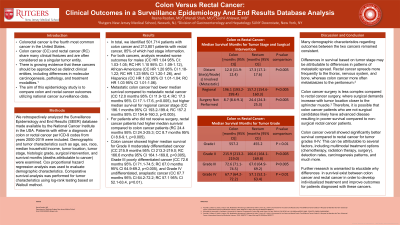Sunday Poster Session
Category: Colorectal Cancer Prevention
P0352 - Colon vs Rectal Cancer: Clinical Outcomes in a Surveillance Epidemiology and End Results Database Analysis
Sunday, October 22, 2023
3:30 PM - 7:00 PM PT
Location: Exhibit Hall

Has Audio

Reena Razdan, MA, MD
Rutgers New Jersey Medical School
Warren, New Jersey
Presenting Author(s)
Reena Razdan, MA, MD1, Manali Shah, MD2, Sushil Ahlawat, MD3
1Rutgers New Jersey Medical School, Warren, NJ; 2Rutgers New Jersey Medical School, Newark, NJ; 3SUNY Downstate Health Sciences University, Brooklyn, NY
Introduction: Colon cancer (CC) and rectal cancer (RC) share many clinical features and are often considered as a singular tumor entity. However, there is limited data to support whether it is appropriate to treat these cancers as one. The aim of this epidemiology study is to compare colon and rectal cancer outcomes utilizing national cancer surveillance data.
Methods: We retrospectively analyzed patients diagnosed with colon or rectal cancer from the years 2000-2019 using the National Cancer Institute Surveillance Epidemiology and End Results (SEER) database. Demographic characteristics such as age, sex, race, median household income were compared using Cox proportional hazard regression analysis. Tumor characteristics such as tumor location, tumor stage, histologic grade, surgical intervention, and survival months (deaths attributable to cancer) were compared using log-rank testing based on Weibull method.
Results: In total, we identified 501,714 patients with colon cancer and 213,801 patients with rectal cancer, 85% of which had stage information. For both cancers, analysis revealed worse outcomes for males (CC HR 1.04 95% CI: 1.03-1.05; RC HR 1.10 95% CI: 1.09-1.12), African-Americans (CC HR 1.20 95% CI 1.18-1.22; RC HR 1.23 95% CI 1.20-1.26), and Hispanics (CC HR 1.02 95% CI 1.01-1.04; RC HR 1.03 95% CI 1.01-1.06). Metastatic colon cancer had lower median survival compared to metastatic rectal cancer (CC 12.0 months 95% CI 11.9-12.4; RC 17.3 months 95% CI 17.1-17.6), but higher median survival for regional cancer stage (CC 196.1 months 95% CI 193.2-199.4; RC 157.2 months 95% CI 154.6-160.3). For patients who did not receive surgery, rectal cancer patients had higher median survival compared to colon cancer patients (RC 24.4 months 95% CI 24.3-25.3; CC 8.7 months 95% CI 8.6-9.1). Colon cancer showed higher median survival for Grade 2 moderately differentiated cancer (CC 215.9 months 95% CI 213.2-219.0; RC 166.6 months 95% CI 164.1-169.8) and Grade 3 poorly differentiated cancer (CC 72.6 months 95% CI 71.1-74.5; RC 67.0 months 95% CI 64.9-69.2).
Discussion: Various tumor characteristics are associated with significant differences in survival when comparing colon cancer to rectal cancer. This supports that the two entities should be viewed as distinct clinical phenomena. Further research is warranted to elucidate histological, physiologic, and genetic factors that may contribute to these differences in survival.
Disclosures:
Reena Razdan, MA, MD1, Manali Shah, MD2, Sushil Ahlawat, MD3. P0352 - Colon vs Rectal Cancer: Clinical Outcomes in a Surveillance Epidemiology and End Results Database Analysis, ACG 2023 Annual Scientific Meeting Abstracts. Vancouver, BC, Canada: American College of Gastroenterology.
1Rutgers New Jersey Medical School, Warren, NJ; 2Rutgers New Jersey Medical School, Newark, NJ; 3SUNY Downstate Health Sciences University, Brooklyn, NY
Introduction: Colon cancer (CC) and rectal cancer (RC) share many clinical features and are often considered as a singular tumor entity. However, there is limited data to support whether it is appropriate to treat these cancers as one. The aim of this epidemiology study is to compare colon and rectal cancer outcomes utilizing national cancer surveillance data.
Methods: We retrospectively analyzed patients diagnosed with colon or rectal cancer from the years 2000-2019 using the National Cancer Institute Surveillance Epidemiology and End Results (SEER) database. Demographic characteristics such as age, sex, race, median household income were compared using Cox proportional hazard regression analysis. Tumor characteristics such as tumor location, tumor stage, histologic grade, surgical intervention, and survival months (deaths attributable to cancer) were compared using log-rank testing based on Weibull method.
Results: In total, we identified 501,714 patients with colon cancer and 213,801 patients with rectal cancer, 85% of which had stage information. For both cancers, analysis revealed worse outcomes for males (CC HR 1.04 95% CI: 1.03-1.05; RC HR 1.10 95% CI: 1.09-1.12), African-Americans (CC HR 1.20 95% CI 1.18-1.22; RC HR 1.23 95% CI 1.20-1.26), and Hispanics (CC HR 1.02 95% CI 1.01-1.04; RC HR 1.03 95% CI 1.01-1.06). Metastatic colon cancer had lower median survival compared to metastatic rectal cancer (CC 12.0 months 95% CI 11.9-12.4; RC 17.3 months 95% CI 17.1-17.6), but higher median survival for regional cancer stage (CC 196.1 months 95% CI 193.2-199.4; RC 157.2 months 95% CI 154.6-160.3). For patients who did not receive surgery, rectal cancer patients had higher median survival compared to colon cancer patients (RC 24.4 months 95% CI 24.3-25.3; CC 8.7 months 95% CI 8.6-9.1). Colon cancer showed higher median survival for Grade 2 moderately differentiated cancer (CC 215.9 months 95% CI 213.2-219.0; RC 166.6 months 95% CI 164.1-169.8) and Grade 3 poorly differentiated cancer (CC 72.6 months 95% CI 71.1-74.5; RC 67.0 months 95% CI 64.9-69.2).
Discussion: Various tumor characteristics are associated with significant differences in survival when comparing colon cancer to rectal cancer. This supports that the two entities should be viewed as distinct clinical phenomena. Further research is warranted to elucidate histological, physiologic, and genetic factors that may contribute to these differences in survival.
Disclosures:
Reena Razdan indicated no relevant financial relationships.
Manali Shah indicated no relevant financial relationships.
Sushil Ahlawat indicated no relevant financial relationships.
Reena Razdan, MA, MD1, Manali Shah, MD2, Sushil Ahlawat, MD3. P0352 - Colon vs Rectal Cancer: Clinical Outcomes in a Surveillance Epidemiology and End Results Database Analysis, ACG 2023 Annual Scientific Meeting Abstracts. Vancouver, BC, Canada: American College of Gastroenterology.
